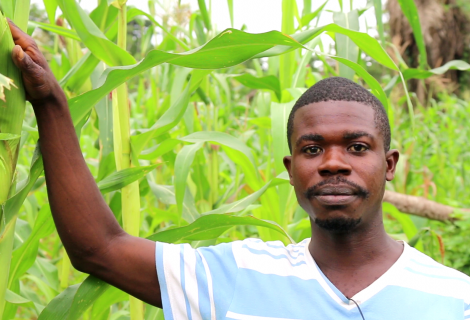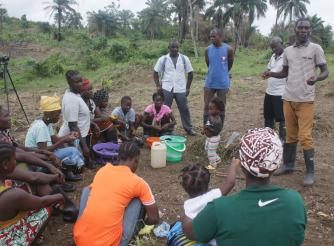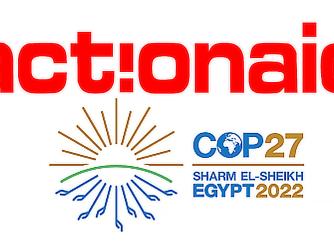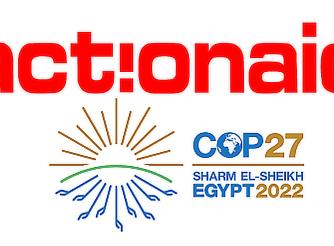Solomon Kollie

Building better futures through ICT and agriculture for urban youth in Liberia
Solomon Kollie, 28, is a member of the Seen-Wen Accountability Forum, located in Gbarzon District, Grand Gedeh County, Liberia. Already a farmer when the ActionAid Building Better Futures project began, Solomon was chosen to be a participant as he and his family depend on farming for their livelihood.
Solomon is married in the traditional way rather than civil. Traditional marriage allows men to marry more than one wife, as well as to take on the responsibility of major household decisions, including things like the distribution of property. Solomon does not yet have any children.
Working in the mines
He is the second child in his family of two boys. He started grade one at the age of 13 years in 1999. At the age of 21 years, in 2011, Solomon was forced to drop out of school due to his family’s lack of funds to pay for school fees. This is an all too common situation in Liberia, where harsh living conditions mean that children are often unable to begin school before the age of twelve. It is not unusual to find classrooms of grade one or grade two students between twelve to fifteen years of age.
In order to help support his family, Solomon turned to work in an illegal gold mine, following the path of many young men in his town. Grueling days, hard labor, and no pay for six months in the mines took its toll on young Solomon, who wished to do more with his life. On top of the harsh conditions, he was unsuccessful in finding any gold or minerals. The frustration with his situation led him to request money for transportation from his supervisor, and he returned home, staying with an uncle who had his own farm. It was through this first exposure to agricultural work that Solomon’s interest in farming and agriculture was sparked.
“I spent six weeks working in the illegal mines looking for minerals in the water, with no success,” said Solomon.
“After six weeks, I went home with nothing, and stayed with my uncle, who survives on agriculture. Helping my uncle on his farm has given me a love of agriculture, because I am able to see real progress and can measure how well the crops are doing. I can also see clearly the challenges we face as farmers, and this helps me find good solutions.”
Passion for farming
Following his time working on his uncle’s farm, Solomon decided to enter the agricultural sector full time. In 2012 he acquired his own plot of land and began to grow crops, focusing on produce with short harvest cycles in order to ensure his ability to feed his family. He has chosen corn and peppers, as these are versatile crops, and have short harvest cycles. Since finding his passion for farming, he hasn’t looked back.
In 2017 when ActionAid initiated the Building Better Futures program, Solomon became a member of the Seen-Wen Accountability Forum, under the umbrella of the second Sustainable Social Enterprise of Grand Gedeh County. Solomon joined a forum of 50 members, 25 female and 25 male, in order to take part in activities conducted by ActionAid designed to build individual and community capacity and knowledge of agricultural skills and issues.
Since joining the program, Solomon has benefited from trainings implemented by ActionAid on the topics of sustainable agricultural practices, tools and resources, youth mentorship and peer support programs for youth, exchanging information, online or SMS-based support on agri-business skills, SMS based mentoring and extension services, and mobile bank transactions. Through taking part in these trainings, Solomon has been able to boost his capacity as an individual, as well as contribute to the sustainability of the Social Enterprise he is part of, and improve the capacity of his community as a whole.
Solomon and his fellow forum members in Seen-Wen are now looking forward to their first big cassava harvest, which will take place in January 2019. The crop was first planted in April 2018, and has approximately a nine month growth period to harvest. ActionAid supported Solomon and his fellow farmers through providing farming tools as well as 200 USD startup grants to each farm for seedlings. They also provide continuous support through trainings and refresher courses, such as the planned refresher course on food processing which Solomon will participate in this coming November.
Cassava is a locally grown plant that can be processed into many different products, such as fufu and gari, and is very versatile and therefore marketable in the local economy. The profits from the harvest of their two acre farm will be collected and reinvested into the Accountability Forum, which will support the initiation of community development projects.
Advertising crops through social media
Earlier this year, Solomon participated in ActionAid training on how to use ICT tools, including social media platforms and smartphones to improve marketing and connect with customers. Through this training, Solomon learned how to utilize his phone for documenting the progress of his crops through pictures and for taking orders from customers:
“We have market days on Thursdays in Seen-Wen, and nearby communities come to buy from our market. Two days beforehand, I snap pictures of my products from my phone and send them to be uploaded on the ICT Hub that ActionAid helped us start. I use this to advertise to the people of Seen-Wen and the neighboring cities like Zwedru, the Capital of Grand Gedeh County. Since I started using the photo system, I have customers calling me every week ahead of market to place orders for corn, which makes the amount of corn I take to market more efficient. I can sell more product without fear of waste.”
Since the start of the BBF program, Solomon’s business has grown extensively. He states,
“I am certain that I will reap over 50 bags of corn. I expect to make over 8000 Liberian Dollars [47 EUR] from selling my corn. I will use this money to finish building my house and to go back to school. I want to study agriculture so that I am able to come back to my community and teach other young people about what agriculture is. I also aspire to be one of the best commercial farmers in Liberia.”
Solomon noted that the project farm planted Cassava root, which will be ready for harverst in March 2019, before the harvest, all farmers attend to their individual farms and rejoin every Saturday with the rest of the AF members to work on the farm. AAL continues to give technically support and skills building on business and using technology to find market for the agricultural crops.


